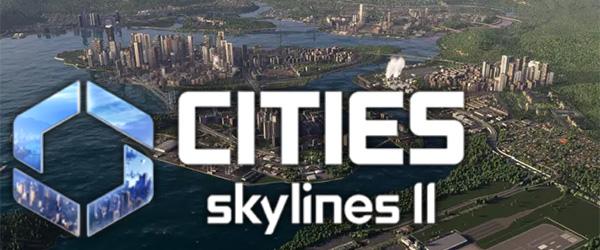
One of the biggest criticisms of Cities Skylines II is that it is lacking content or feels "incomplete". I don't necessarily disagree, but I feel like saying that the game feels "incomplete" might be doing it a bit of a disservice. It is lacking a lot of content from the original game, sure, but that original game had over a dozen expansions and countless content packs and mod assets released over its decade-long life cycle. So of course there's going to be things that the original, expanded game had, which the new game doesn't have.
But the sequel also has (and does) a lot of things that the original didn't do. It has a much more complicated economy, in which all industries generate specific types of raw materials or goods, and all commercial stores sell specific types of goods or resources. Basically, the core idea of the Industries expansion supply lines and logistics was expanded out to the entire game, rather than just those few specialized industries.
In fact, the sequel includes content or ideas from almost all of the original game's expansions. In addition to the industrial aforementioned seasonal cycle and industrial supply lines, we also have a few natural disasters, some eco-friendly upgrades to various polluting infrastructure, pedestrian roads, road-building tools that put Mass Transit to shame, and some customizable, modular buildings.
Unfortunately, some of these mechanics imported from the original game (and its expansions) do not quite live up to my hopes and expectations. I made a video describing how the modular buildings and industry areas of Cities Skylines II do not live up to the expressiveness and creativity of the Parklife and Industries areas from the first game. I'm not going to transcribe the entire video here. Instead, I will summarize the main points and ideas, and refer you to the full video if you want more detail and examples.
Full video outlining my suggestion for improving building upgrades and industry areas.
Also, I would like to remind my readers and viewers that video and blog content like this is supported by viewers like you through Patreon. So if you like this content, and would like to see more like it, please consider becoming a Patreon for just a dollar or 2 a month. Your patronage helps to offset the cost of maintaining this website, as well as the software licenses I use to create the video content.

Patrons also get previews of and early access to upcoming content, and Patrons at higher tiers have voting power in polls of upcoming projects. I've been working on a massive project about Star Trek video games over the past few months. There are currently a couple previews available on Patreon, and I plan on releasing the entire project early to Patrons when it's finished, while publishing the episodes one at a time to the general public. So if you'd like to see that project early, then consider becoming a Patron. I'd like to take this opportunity to thank all my Patrons, past, present, and future. Your support really means a lot.
[More]

I've been playing Cities: Skylines for almost 10 years. As soon as I started playing it, I recognized it as the definitive city-building game. It blew its contemporaries, such as SimCity (2013) and Cities XL out of the water. It was a smash success that developed a massive following and spawned 11 full expansions, 4 mini-expansions, 21 asset packs, numerous music packs, and thousands of player-created mods and custom assets.
Creating a sequel to a game that is so beloved and content-rich can be challenging or daunting. Sequels to extensively-expanded games, such as any given entry of The Sims, Civilization, Crusader Kings, World of Warcraft, Rock Band, and so forth, run the extreme risk of feeling bland, empty, and incomplete compared to their content-rich and/or mechanically-complex predecessors. This can leave the sequel feeling underwhelming to long-time audiences, who might return to the older game because they crave the extensive, familiar content. The Sims in particular is infamous for stripping out popular expansion content, and then selling that content back to consumers again (and again) as an expansion pack for the sequel. The most notable example is probably that every Sims game has a "Pets" expansion, because EA could never bite the bullet and just put dogs and cats in the vanilla launch of a sequel.
Sequels to expanded games often strip out popular content to re-sell as expansions.
The sequel to Cities: Skylines is a bit of a mixed bag in this regard. On the one hand, yeah, a lot of content from the original game is absent from the sequel, and the options for what players can build can feel a bit sparse. On the other hand, the vanilla release of Cities: Skylines II retains something from almost every one of the original game's expansions. It even includes content and mechanics that were part of some of the smaller content packs and from popular mods.
The vanilla game includes a day/night cycle that was introduced in the original's After Dark expansion. Some of the economic models of the After Dark and Industries expansions have been expanded in scope to apply to the entire game, thus alleviating some of the need for explicit tourism, leisure, or specialized industry districts. It took the winter themes of Snowfall and fleshed it out into a full seasonal cycle. It includes some of the weather and disaster events from Natural Disasters, as well as some of the early-warning and shelter infrastructure. It includes modular upgrades and customizations to certain buildings and infrastructure, as well as large industrial areas, that fills a similar role as the modular areas of Parklife, Industries, Campus, and Airports (though I'll talk more about this mechanic later in the review). It includes pedestrian roads from Plazas & Promenades. It includes eco-friendly variations of utilities that were part of the Green Cities expansion. And of course, it has road-building and transit-planning tools that largely leave Mass Transit in the dust.
It even includes sports parks and parking lots, which were late DLC content released for the original game in the last couple years. And the road-building and traffic-management tools have much of the functionality from the popular "Road Anarcy" and "Network Extension" mods. And that's to say nothing of all the brand new content, mechanics, and more complicated simulation! So even though it is not as full or content-rich as its predecessor with its double-digit expansions (how could it be?!), Cities: Skylines II is still a fully-featured and content-rich city-builder that can be played for many hours before going stale.
Some content and mechanics from almost every CS1 expansion are included in CS2's launch.
But as I said, there is quite a lot of content from the original game that did not make the cut, and which is sorely missed. For one thing, bicycles and bike lanes aren't in the game at launch, which is a kind of baffling decision (considering this game is developed in Scandinavia, where bicycling is huge). There also aren't any walls or fences or quays, and the tool for disabling zoning on either side of a road is strangely absent. So it's back to using pedestrian paths to remove zoning from arterial roads. Zoning is actually quite a bit of a pain in the ass in the sequel, and I am frequently fighting with the road layout, zoning squares, and pedestrian paths to try to get my city to look the way I want.
If you were particularly fond of leveling up and expanding things like industrial parks, nature preserves, amusement parks, universities, and so forth, then you might be disappointed by their absence. In fact, recreation, leisure, and tourism options are very spares in the sequel, as it lacks the tourism and leisure districts of the After Dark expansion. You also won't be building any small fishing villages, since Sunset Harbor is the one expansion that doesn't have anything being carried over into the sequel.
To its credit, the vanilla release of Cities: Skylines II feels more content rich and mechanically-compelling compared to the vanilla release of the original Cities: Skylines. But there's so much absent from the original game, that I un-install the original from my PC with a degree of trepidation.
There is some content from CS1 that is conspicuously absent. [More]
a2c0f15c-0983-4034-a8e5-7561b2c76190|0|.0
Tags:Cities: Skylines, Cities: Skylines 2, Colossal Order, Paradox Interactive, city, city management, city simulation, seasons, industry, parking, tourism, poverty, homelessness, welfare, subsidies, ray-tracing, volumetric lighting, Sedona, Barstow
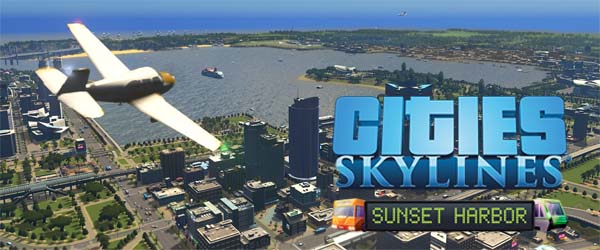
I was starting to wonder if maybe Colossal Order was done with Cities: Skylines, or they had moved on to development of a full sequel. After releasing two expansions per year since the game's launch in 2015, we've now gone almost a year between expansions. The last one was the Campus expansion last May. Now here we are with a new Sunset Harbor expansion.
The announcement for this expansion (a mere week before its release) got my hopes up in a similar fashion to the Snowfall expansion. I thought that Sunset Harbor would add a slew of features that I had been longing for in the game for a long time. Sadly, Sunset Harbor disappointed me in much the same way that Snowfall's lack of a seasonal cycle and poor implementation of ski resorts did. Sunset Harbor lacks almost all of the things that I had hoped for, and it continues a trend of Skylines expansions that add new mechanics or content without revising or enhancing existing mechanics or content to utilize the new ideas.
Much like past expansions, Sunset Harbor neglects a lot of seemingly-obvious content.
When I saw the title of the expansion, I thought for sure that this would be the expansion that would finally introduce public beaches! No such luck. There's no public beach area. Sunset Harbor (despite having "harbor" in its title) does not introduce modular passenger and freight harbor areas, or upgrade harbors into a leveled industry like Industries did with agriculture, forestry, ore, and oil. I still can't daisy-chain my harbors to send shipping routes up rivers or canals, despite the fact that the existing passenger ferries and the new fishing industry can. It similarly doesn't convert tourism and leisure into leveled industry or commercial areas.
As always seems to be the case with Skylines expansions, I'm torn between whether I should review the expansion from the perspective of what it actually brings to the table, or from the perspective of failing to meet my own hopes and desires for what the expansion should be.
One of the things that was missing from Industries
Sunset Harbor does, however, check off a couple items from my wishlist. At long last, it has provided a desert biome map! As someone who lives in the American Pacific Southwest, I've long been frustrated by the inability to create a city that looks more like the familiar landscape of my own back yard. Now I finally can. Sadly, it's only one map, but the asset editor that's always been included in the game will allow me to make more if I want to, without having to resort to downloading mods that might destabilize the game.
I've long hoped for a desert biome to be added to the game.
The big feature of this expansion is also a feature that I thought was missing from the Industries expansion. I complained that Industries only added new infrastructure that replaced the existing agriculture, forestry, ore, and oil industries that have always been in the game, and didn't bother to add any new industries. Parklife, by comparison, added a couple new types of parks that hadn't been in the game before, including nature preserves and an amusement park. Personally, I thought that the most obvious option for a new industry to add to Industries would have been a fishing or aquaculture industry. Well, now we have a whole expansion that has added that one idea.
The new fishing industry doesn't follow suit with the Industries expansion industry areas, or the Campus university areas. You don't paint aquaculture areas and then grow them and level them up. There's no complicated production line or logistic element. The different types of fish that you can catch also don't do anything different. There's no fancy factories that consume specific types of fish (like a pizza factory that consumes anchovies), or that combine your fish with other types of fish (like a fish stick factory), or with other industry products to create a more valuable luxury good (like combining fish and seaweed with crops to make sushi).
Aquaculture does not level up or have production lines like other industrial sectors.
Instead, there's a handful of fishing harbors that act as resource-extractors, and then there's exactly two buildings that process or consume them. Your fishing harbors can either sell their fish to a market to be sold directly to consumers, or the raw fish (regardless of type) can be shipped to a factory that processes the fish and distributes them as generic goods to send out to commercial zones. In lieu of either the market or the factory, the fish will be exported to other cities for a small amount of money.
That's it! That's everything that fishing has to offer!
... [More]
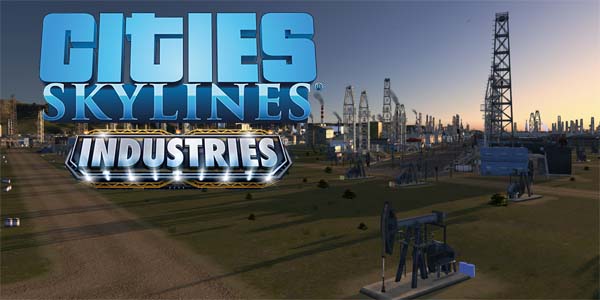
Wow, Colossal Order is really popping out these Cities: Skylines expansions in rapid succession! I feel like this is the third or fourth expansion in the last year alone! ... Hold on, let me check ...
| Expansion title | Original release |
 | After Dark | 24 September 2015 |
 | Snowfall | 18 February 2016 |
 | Match Day* | 9 June 2016 |
 | Natural Disasters | 29 November 2016 |
 | Mass Transit | 18 May 2017 |
 | Concerts* | 17 August 2017 |
 | Green Cities | 19 October 2017 |
 | Parklife | 24 May 2018 |
 | Industries | 23 October 2018 |
| * denotes a mini content pack, rather than full expansion. |
... So, yeah; third full expansion in the last 12 months (give or take a few days). Fourth expansion in the last 14 months if you want to count the Concerts content pack. Colossal Order seems to have been following a pattern of two full expansions and a mini content pack each year since the game released. I guess that's one way to keep your game relevant. It has certainly kept me coming back every few months.
Never as robust as I would like
The problem is that the limited development time means that the content that is provided in these expansions rarely ever feels as robust or comprehensive as it should -- at least, not to me. As such, I feel like I'm getting diminishing returns from each new expansion. The amount of content that is already in the game means that each new expansion feels like relatively smaller drop of content into an already-large bucket. Each expansion feels like it gives us less to do, and has that much of a smaller impact on the overall gameplay experience.
Adding to the problem of diminishing returns: every single expansion has had some glaring omission or weakness that bothered me, and none of the later expansions have bothered to go back in and address the weaknesses and limitations of the previous expansion(s). After Dark failed to include zoneable public beaches and didn't really make the day/night cycle feel as meaningful as it should. Snowfall failed to include season cycles to go along with After Dark's day/night cycle, and completely dropped the ball with regard to mechanics like ski resorts. Natural Disasters probably felt like the most "complete" and well-rounded expansion (not to mention the most novel one), but still suffers from its content being random, and it neglected to introduce any winter-specific disasters to go along with Snowfall.
Industries follows a long-standing trend with Skylines expansions neglecting seemingly-obvious features.
Mass Transit brought the long-overdue ferry transit option, but neglected to revise cargo harbors to make cargo ship routes more practical, and didn't have any water-based city services (like a coast guard, for example) that would allow a true island economy to function without a network of bridges for freight and emergency services. Green Cities was maybe the laziest expansion, and it focused on pollution-management, but didn't bother to actually make pollution any more relevant or challenging to begin with. Lastly, Parklife granted a lot of player expression, but failed to incorporate the legacy parks into the new modular park feature and doesn't allow the camera to zoom in close enough to get a good look at your pretty decorations.
This isn't to say that all these expansions are "bad". I've liked them all (except maybe for Snowfall and Green Cities), but none of them have really wow-ed me with their content (except maybe for Natural Disasters). And the modular nature of each expansion means that it has limited-to-no impact on the core game systems, and limited-to-no interaction with the previous expansions.
The latest expansion, Industries follows suit. It promises to re-invent the way that your cities' industry functions, but kind of does it in an almost half-assed way. Much like the expansion before it, Parklife, Industries doesn't really incorporate the old legacy industry zones into the new industry mechanics. The new "Industry Area" paintbrush is virtually the same mechanic as the Park Area paintbrush from the last expansion. It isn't a replacement for the original industrial district specialization, so if feels like it's pretty much duplicating that content rather than re-inventing it.
You paint an area as an "Industrial Park", just like the parks in Parklife.
... [More]
e7bfb680-e9c4-4e53-a202-52f87d32d445|3|3.7
Tags:Cities: Skylines, Cities: Skylines: Industries, Colossal Order, Paradox Interactive, city, city planner, city simulation, Cities: Skylines: Parklife, Cities: Skylines: After Dark, industry, pollution, natural resources, resources, production chain, district, farm, timber, lumber, ore, mining, oil, drilling, leisure, commerce
A friend of mine introduced me to the social game SimCity Buildit, currently available for mobile devices and tablets. Since I currently lack a strong mainstream entry in the SimCity franchise, I thought I'd see if this social game does anything to fill my long-neglected need for spline-reticulation or if it presented any new features that could be worth pursuing in a full PC version of the game. I don't generally play social games. I dabbled a bit with CivWorld and Sims Social, but that's about it. So I lack a lot of reference for judging SimCity Buildit in terms of other social games.
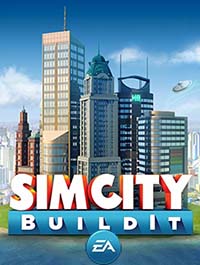
Most of the fundamental SimCity elements are here: you set housing, commercial, and industrial zones, link them with roads, and build service buildings in order to satisfy various citizen needs within a certain radius. None of the deeper simulation elements of newer city-builder games are there. Individual citizens don't exist; there's just an abstract population, and happiness levels are set for each residential building. It's understandable for the limitations of the platform, and it provides a retro quality that reminds me of the good ol' days of SimCity 4.
But since this is a social game, the design has to put up numerous barriers to restrict the player's freedom to construct the city that they want. You have to "level up" your city by building new buildings. The number of residences that you can build, as well as the availability of industry and shops are also limited by your level or by the city population.
You also don't really have an economy to manage - at least not in the traditional sense. Citizens don't work at factories and shops. Instead, these buildings create certain building materials that are used to "upgrade" your residences into higher-density buildings that generate more tax revenue. This provides the core challenge of the game: you have to build the necessary materials in order to upgrade your buildings. Each of these materials take different amounts of real time to construct in your factories and shops (or you can buy the materials you need through real-money micro-transactions). As you level up, you'll unlock new materials, which residences will suddenly demand in order to upgrade their buildings.
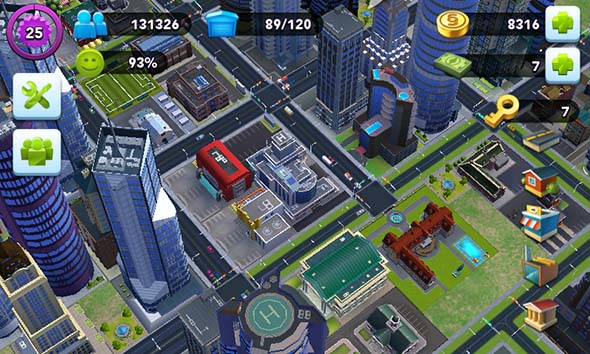
You don't have to manage employment, tax rates, or city ordinances; only resources and service coverage.
The ability to upgrade a building seems to be limited by its happiness level. Only happy residences can be upgraded, so you also need to provide city services such as power, water, waste disposal, emergency services, entertainment, and so on. But these services are very frustrating because they are tied to your city level. New services or entertainments become unlocked when you level up. That's fine. But once those services are unlocked, your entire city starts demanding them, and happiness plummets (as well as tax income, which is tied to happiness) because you don't already have the infrastructure ... [More]
32090159-6899-4ab5-bbd5-d5b6d927f5a0|0|.0
Tags:SimCity, SimCity Buildit, Electronic Arts, EA, Track Twenty, online, social gaming, mobile, mobile gaming, Facebook, Google Play, city simulation, public service, disaster, industry, supply
|

| 12 | | | | | | | 60 | | 11 | | | | | | | 55 | | 10 | | | | | | | 50 | | 09 | | | | | | | 45 | | 08 | | | | | | | 40 | | 07 | | | | | | | 35 | | 06 | | | | | | | 30 | | 05 | | | | | | | 25 | | 04 | | | | | | | 20 | | 03 | | | | | | | 15 | | 02 | | | | | | | 10 | | 01 | | | | | | | 05 |
|